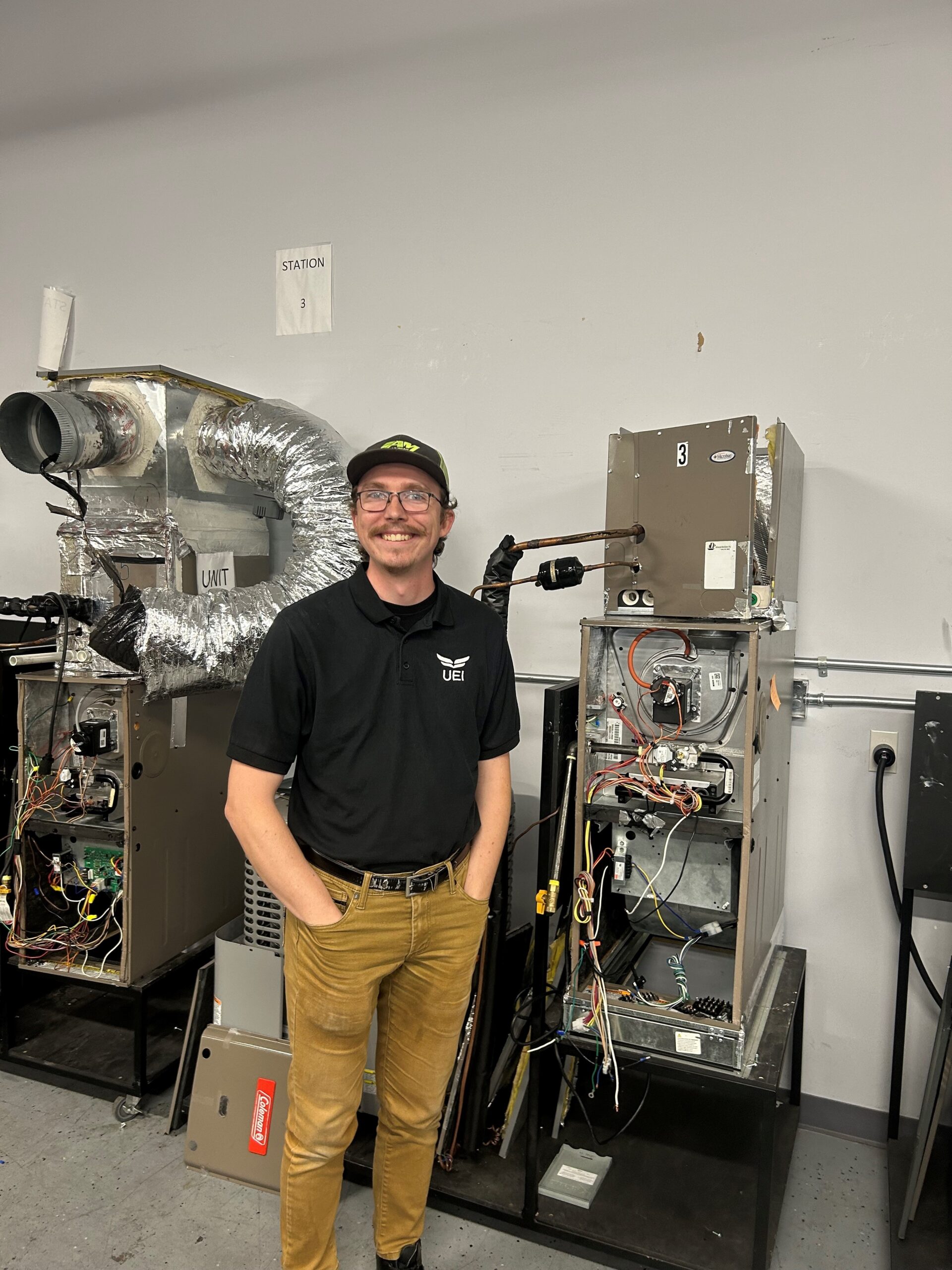HVAC Technician vs Electrician (Differences Explained)
| Update: September 05, 2024
If you’re considering becoming either an HVAC technician or an electrician, you might be wondering what the difference between an electrician vs. an HVAC technician is. This post provides you with everything you need to know about the two careers and introduces you to the HVAC Program and Electrician Technician Programs that UEI College offers.
Interested In Our Electrician Technician Program? CLICK HERE >
Before we dive into the differences between the two career choices, if you’re interested in becoming an HVAC Technician or an Electrician Technician and you don’t want to go to a four-year college to earn a degree, consider enrolling in UEI’s Career Training Programs. UEI provides an Electrician Training Program as well as an HVAC Training Program. The great thing about the programs is that you can complete the program and earn your diploma in as few as 10 months, placing you on a fast track to beginning a new career.
HVAC Technician vs Electrician: What Are the Differences?
Before diving into the differences and similarities between Electrician Technicians and HVAC Technicians, let’s explore what each career is about.
What is an Electrician?
An electrician technician is a skilled professional who is often tasked with installing, repairing, and maintaining electrical systems, wiring, and equipment in residential, commercial, and industrial buildings.
List of Common Electrician Duties
- Install new wiring in buildings
- Replace old wiring in buildings
- Install switches, relays, or other power distribution equipment
- Test electrical systems to ensure they’re functioning properly
- Inspect, troubleshoot, and repair electrical systems or faulty electrical equipment
- Maintain electrical systems
- Troubleshoot and repair electrical malfunctions
- Install control systems and lighting systems
- Plan the layout and installation of electrical wiring, fixtures, and equipment
HVAC Tech vs Electrician: Education and Training Requirements
If you’re considering becoming an HVAC Technician or an Electrician and want to attend a vocational school such as UEI to earn your diploma, the educational requirements to enroll are very similar. Vocational programs do an excellent job of providing students with the knowledge, skills, and hands-on training that they will need to begin a new and rewarding career.
To enroll in a program, you will need a high school diploma; however, if you do not have your high school diploma, UEI College offers students the option of working on obtaining their high school diploma while training for a new career (HVAC or Electrician). So, if you’re interested in training for an HVAC or Electrician career and you don’t have your high school diploma, contact us to learn more about your options.
In the event that you don’t want to enroll in a trade school to obtain the training necessary for a career as an HVAC Tech or Electrician, you have the option of completing an apprenticeship by working alongside experienced professionals. That said, taking this route takes significantly longer, and it is often difficult to find a professional who is willing to take you under his wing to teach you the trade.
The best option is to enroll in a career training program because these programs are designed to provide students with the knowledge, skills, and hands-on training needed to begin a new and rewarding career in as few as 10 months. Whereas becoming an electrician or HVAC technician by doing an apprenticeship may take 3 to 5 years to complete. So, the faster option is to enroll in career training programs such as those offered by UEI College.
HVAC Technician vs Electrician Technician: Work Environment
The work environments for both electricians and HVAC technicians are very similar. For example, electricians often work inside or outside buildings to run wiring and install electrical equipment in buildings. Typically, an electrician will spend his day commuting from one job site to another. Job sites may include residential, commercial, and industrial buildings. That said, as an electrician, you should be prepared to work both indoors and outdoors. For example, if you’re working at a construction site, you may be required to work outdoors in varying temperatures.
HVAC technicians are similar to electricians, but the majority of an HVAC Technician’s time is spent working indoors. That said, HVAC technicians are also sometimes tasked with completing work that is outdoors where they may be exposed to extreme temperatures. Additionally, HVAC Technicians are often on-call, requiring them to respond to HVAC emergencies at the most inopportune times in extreme weather. Extreme weather often causes systems to malfunction, requiring HVAC Techs to work during extreme weather. So, if you’re considering becoming an HVAC technician or an electrician, these are some things that you should keep in mind.
Should You Become an Electrician or HVAC Technician?
The answer to this question depends on whether you prefer to become an electrician or an HVAC technician. Both careers require someone who is active and willing to travel from one job site to another to address customer problems. The only difference is that electricians deal with electrical wiring, electrical systems, and equipment, while HVAC Technicians deal with HVAC systems and some electrical wiring. So, it really depends on your preference because both professions are very similar in terms of the environment you’ll be working in and the tasks you’ll be required to perform.
Frequently Asked Questions
1. Which is better electrician or HVAC technician?
It really depends on whether you want to become an electrician or HVAC technician. If you like dealing with the latest HVAC technologies, then a career as an HVAC tech may be the right move for you. On the other hand, if you like dealing mainly with electrical wiring, electrical systems, and lighting, then a career as an electrician may be the right move for you. So, it really depends on what you want to do.
2. Which is harder to learn HVAC or electrical?
HVAC and electrical are very similar. Students are trained on real equipment, and both programs can be completed in as few as 10 months. It is very difficult to say which one is easier because they both involve hands-on learning and theory.
3. Do you need a high school diploma to become an electrician or HVAC Tech?
Typically, to become an electrician or HVAC technician by completing a trade school program, trade schools require students to have a high school diploma or GED. That said, if you do not have a high school diploma, you should not be discouraged. For example, UEI College allows students to earn their high school diploma while training to become an HVAC Technician or Electrician, allowing students to complete the program in as few as 10 months.
4. Is an HVAC Tech an Electrician?
HVAC Technicians are not electricians. HVAC technicians specialize in installing, maintaining, and repairing air condition, heating, and refrigeration systems, while electricians specialize in electrical systems. These are two different careers.




